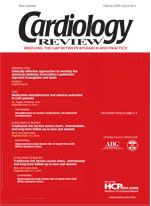Antibodies to heparin increase postoperative risk of complications
Cardiac surgery
Montreal—The presence of antibodies to heparin is an independent risk factor for potentially serious complications following cardiac surgery, and this risk is independent of the risk posed by the development of heparin-induced thrombocytopenia (HIT), according to a study presented by David Kress, MD, at CHEST, the 71st annual meeting of the American College of Chest Physicians.
“We found that whether the patients developed thrombocytopenia postoperatively had no further effect on the postoperative morbidity (associated with heparin antibodies),” said Dr. Kress, senior cardiothoracic surgeon, Aurora
St. Luke’s Medical Center, Milwaukee. “It was the presence of the antibodies that appeared to be related to it. Most studies looking at complications of heparin only look at HIT. This syndrome that we’re talking about is almost an entirely different disease than HIT. And it hasn’t been discussed much in the literature up to this point.” The clinical risk associated with heparin/platelet factor 4 (HPF4) antibodies in patients who do not have HIT is poorly understood in clinical practice, he said.
Using the Society of Thoracic Surgeons National Adult Cardiac Surgery Database, postoperative outcomes were evaluated for 1,114 consecutive patients undergoing coronary artery bypass graft surgery and/or valve surgery who were screened in an unselected manner for HPF4 antibody status over 2.5 years. Sixty (5.4%) of the patients tested had positive HPF4 antibodies preoperatively. Compared with patients who were antibody-negative, those with HPF4 antibodies had
• A greater incidence of acute limb ischemia (5.0% versus 0.9%, P = .03),
• A greater incidence of renal dialysis (11.7% versus 4.3%, P = .02),
• A greater incidence of gastrointestinal complications (15.0% versus 5.7%, P = .01),
• A greater incidence of prolonged mechanical ventilation (> 96 hours, 21.7% versus 8.8%, P = .01),
• Longer median intensive care unit length of stay (56 versus 42 hours,
P < .05), and
• Longer median postoperative length of stay (9 versus 7 days, P < .01).
“The patients that were heparin antibody-positive were more likely to need renal dialysis than diabetic patients, were more likely to develop acute limb ischemia than if they had peripheral vascular disease, and were more likely to have longer ventilation times than if they had low ejection fractions,” he said. HPF4 antibodies typically indicate that a patient has had past exposure to heparin and is at greater risk for developing HIT, a life-threatening immune-mediated complication of heparin administration that contraindicates further heparin exposure.
HIT syndrome occurs in about 3% of the patients undergoing cardiac surgery and overt thrombosis occurs in 50% of HIT patients. Clinical consequences of HIT include limb ischemia requiring amputation, myocardial infarction, stroke, pulmonary embolism, and death. Optimal preoperative care for cardiac surgery patients should include screening for HPF4 antibody status, said Dr. Kress.
Alternatives to heparin are in late-phase clinical trials. Some appear to be less antigenic than heparin while retaining many of the properties of heparin,
he added.
The development of HPF4 antibodies will be more frequent, Dr. Kress predicted, because many patients coming to surgery have had previous percutaneous coronary interventions with heparin exposure.
